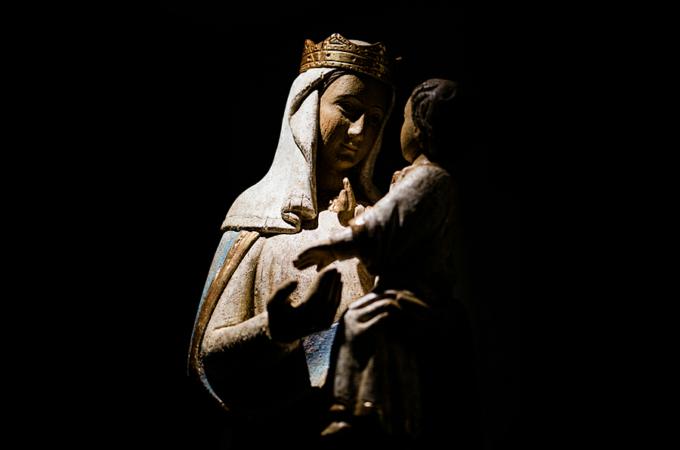Seeking correction on Virgin Mary
Q. Several weeks ago in your column, you stated that Mary remained a virgin after Jesus' birth and for the rest of her life. The Bible states otherwise. Matthew 1:24-25 says that Joseph "did not know her until she had brought forth her firstborn Son."
Other passages reveal that Jesus had other siblings, born to Joseph and Mary after the birth of Jesus. (James is named as one of the half-brothers of Jesus). It would be helpful if you were to make this correction in a future column. (La Belle, Missouri)
A. According to the consistent and centuries-old teaching of the Catholic Church, no correction is needed. As the Catechism of the Catholic Church states, quoting St. Augustine from the fifth century, Mary "remained a virgin conceiving her Son, a virgin in giving birth to him, a virgin in carrying him, a virgin in nursing him at her breast, always a virgin" (No. 510).
The early leaders of Protestantism, in fact -- including Calvin, Luther and Zwingli -- virtually all accepted the doctrine of the perpetual virginity of Mary.
Regarding the passage you quote from Matthew (1:25), as my earlier column explained, the Greek word that is translated "until" says nothing about what happened afterward. (Greek translators used the same word -- "eso" -- to say in 2 Samuel 6:23 that the daughter of Saul "had no children until the day of her death.")
But the main reason I have chosen to run your question is to comment on your view that Jesus had other siblings. All four evangelists do, in fact, make some mention of his brothers and sisters. Mark 6:3, for example, asks: "Is he (Jesus) not the carpenter, the son of Mary, and the brother of James and Joses and Judas and Simon? Are not his sisters here with us?"
Some Catholic scholars explain that the Greek word "adelphos" can mean not just blood brothers, but half-brother, stepbrother or even cousins -- the speculation being that Joseph may have had children from a previous marriage, making them step-siblings of Jesus.
(There is no record of Joseph's age at the time of his betrothal to Mary, and some commentators think that Joseph may have been considerably older than Mary, since he is not mentioned at all in the Gospels after the childhood of Jesus.)
The crucifixion scene would seem to corroborate the Catholic belief that Jesus was the only child of Joseph and Mary: In Jewish custom, the obligation of caring for a widowed mother would pass to the next oldest if anything happened to the firstborn son; but since Jesus had no "blood brother," he entrusted Mary on Calvary to the care of John, the beloved disciple.
Q. Until recently the Catechism of the Catholic Church said that capital punishment was acceptable under some circumstances. Now it says that the death penalty is inadmissible. Therefore, if the teaching was wrong before, then it may be wrong now. (Woodbridge, Virginia)
A. It is true that the position of the Catholic Church against the use of the death penalty has been strengthened because of a textual change in the Catechism of the Catholic Church announced by Pope Francis in August 2018.
Previously the catechism had read: "The traditional teaching of the church does not exclude recourse to the death penalty, if this is the only possible way of effectively defending human lives against the unjust aggression" (No. 2267). (The same section was quick to point out, though, that the cases which warranted the execution of the offender in today's society were "very rare, if not practically nonexistent.")
The new catechism text authorized by Pope Francis, however, will speak even more absolutely and will now read, "The church teaches, in the light of the Gospel, 'that the death penalty is inadmissible because it is an attack on the inviolability and dignity of the person,' and she works with determination for its abolition worldwide."
The church's moral teaching has been developed and refined over time, as is evident from its positions on slavery and on usury (charging interest on loans). The new text of the catechism will itself explain the thinking behind the revision, pointing out that: "Today ... there is an increasing awareness that the dignity of the person is not lost even after the commission of very serious crimes.
"In addition, a new understanding has emerged of the significance of penal sanctions imposed by the state. Lastly, more effective systems of detention have been developed, which ensure the due protection of citizens but, at the same time, do not definitively deprive the guilty of the possibility of redemption."
- Father Kenneth Doyle is a columnist for Catholic News Service



















